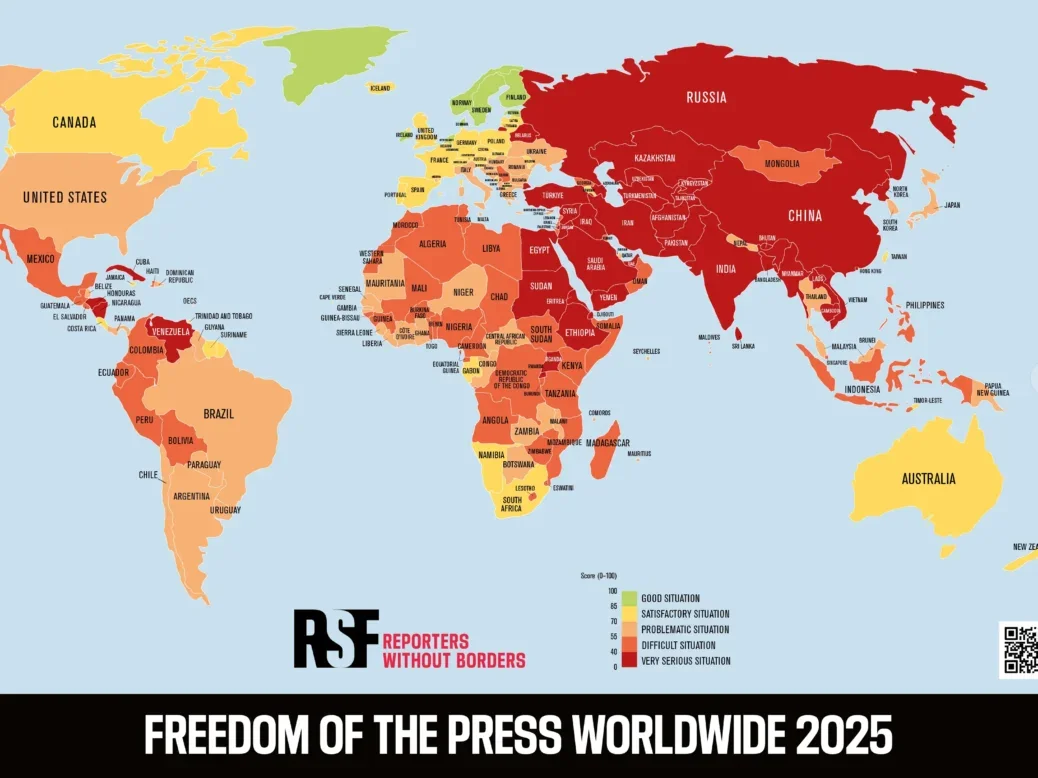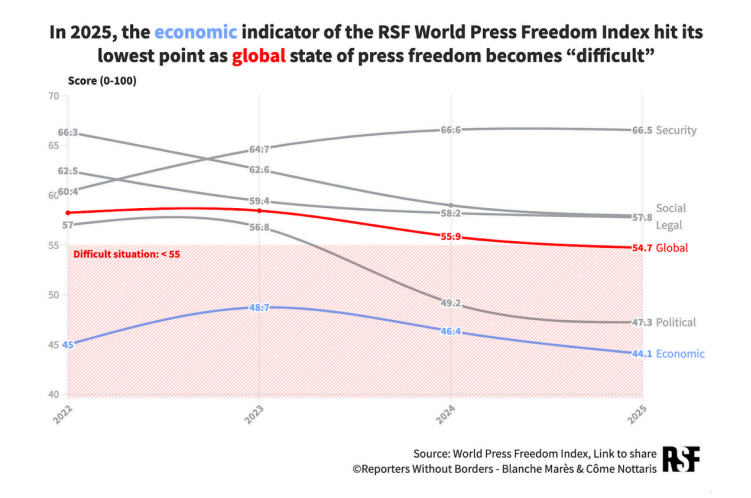
Global press freedom has hit an all-time low as measured in Reporters Without Borders’ annual index.
The 2025 edition of the non-profit’s Press Freedom Index is the first to classify the international media freedom situation as “difficult”, a downgrade from its earlier “problematic” status and the second-lowest grade possible.
RSF attributed the decline to “an unprecedented, critical low” in the financial health of the free press.
The organisation creates its national press freedom scores by assessing five “indicators”: the economic, political, legal and sociocultural contexts in each nation as well as their safety situation.
In 2025 these scores (out of a total of 100) averaged 54.7 across all 180 territories assessed, down from 55.9 last year and low enough to pass into RSF’s “difficult” category.
The average economic score internationally was 44.1 – also a record low and the lowest score of any of the indicators, down from 46.4 last year, 48.7 in 2023 and 45 in 2022.

“Much of this is due to ownership concentration, pressure from advertisers and financial backers, and public aid that is restricted, absent or allocated in an opaque manner,” the non-profit said. In 92 of the 180 countries evaluated, a majority of RSF survey respondents agreed with a statement that media owners “always” or “often” limit their outlet’s editorial independence.
“The data measured by the RSF Index’s economic indicator clearly shows that today’s news media are caught between preserving their editorial independence and ensuring their economic survival,” RSF said.
Conditions were deemed “satisfactory” overall in less than one in four countries and “poor” in half.
Which countries improved and which declined in the 2025 RSF Press Freedom Index?
Norway remains the only country with a “good” rating across all five indices. Estonia moved up four spot to second, followed by The Netherlands (up one). Sweden dropped one place to fourth, Finland remained static at fifth and Denmark fell four spots to sixth.
Brazil “continues its recovery from the hostile climate of the Bolsonaro era”, RSF said, rising 47 spots since 2022 and one of the few countries where the economic indicator improved.
The three biggest single-year rises up the charts were all in Latin America. Paraguay and Bolivia both jumped 31 places to 84th and 93rd respectively. Bolivia retains an overall “difficult” designation but Paraguay’s was upgraded to merely “problematic”. Panama, similarly, rose 30 places to 53rd.
Two countries, Poland and Gabon, moved from a “problematic” classification by RSF to “satisfactory” after moving up respectively 16 and 15 spots to 31st and 41st. Somalia (136th place) lost its “very serious” designation, and is now only regarded as having a “difficult” level of press freedom. Albania and Malaysia also went from “difficult” to “problematic”.
Going the opposite direction, Portugal lost its “good” designation, falling one spot to eighth place and now deemed to have a “satisfactory” press freedom situation.
The biggest fall in rank was at Guinea (103rd), which dropped 25 places and was downgraded from “problematic” to “difficult”. It was closely followed by Kosovo (99th) and Kyrgyzstan (144th), which both fell 24 spots, with the latter being redesignated with a “very serious” press freedom environment.
Other countries newly classed as “very serious” include Rwanda (135th), Ethiopia (145th), Hong Kong (140th), Jordan (147th) and Uganda (143rd).
The UK sits at 20th place, with a “satisfactory” overall rating and up three places from 2024. The rank places the UK immediately behind Trinidad and Tobago and Belgium and ahead of Canada, which fell seven spots compared with the prior year.
Fiona O’Brien, RSF’s UK director, said the UK’s rise was due to the movement of other countries around it, but “there have been some positive developments in the UK this year, including growing political consensus on the need for anti-SLAPP legislation and the release of Julian Assange”.
However, she said these “have been offset by transnational attacks on journalists, worrying cases of police surveillance of journalists, and the targeting of journalists during riots in summer 2024. The UK’s economic indicator remains its weakest, with ongoing concerns around concentration of ownership, job losses and declining profitability. Now that the new Government has settled in, we need to see a real commitment to press freedom from the UK, both at home and abroad, and in actions as well as in words”.
No country in the Middle East and North Africa region was deemed to have satisfactory overall press freedom. In a quarter of those countries it was classed as “problematic”, half as “difficult” and another quarter as “very serious”.
“The situation in Palestine is disastrous” in particular, RSF said, with Israel dropping 11 places to 112th because “it continues to repress its own news media”.
The organisation said Palestine, itself ranked 163rd, remained “one of the most dangerous states in the world for reporters”, citing the large number of journalists and media workers killed by the Israeli military, the ongoing exclusion of foreign reporters and that outlets there “have seen their newsrooms and equipment destroyed”.
The Asia-Pacific region had the next worst overall press freedom, with 16% of countries deemed to have a “very serious” press freedom situation, followed by Africa (13%).
The 42 countries with a “very serious” overall press freedom situation are collectively home to 57% of the global population, RSF said.
The US, which had already dropped down to a “problematic” overall rating, fell a further two spots from its 2024 position to 57th place, immediately behind Sierra Leone and Romania.
“Donald Trump’s second term as president has led to an alarming deterioration in press freedom, indicative of an authoritarian shift in government,” RSF said, prompting a 28-place drop in the country’s social indicator score.
Its economic score has also fallen 14 points in two years. Six-tenths of journalists surveyed by RSF in Arizona, Florida, Nevada and Pennsylvania agreed with the statement that it is “difficult to earn a living wage as a journalist”, a figure that rose to 75% for the statement “the average media outlet struggles for economic viability”.
Europe is “increasingly divided” when it comes to press freedom, RSF said, with the Eastern Europe and Central Asia region experiencing “the steepest overall decline worldwide”. Although the EU and Balkans retain the highest scores globally, 28 of the 40 countries in the group saw their economic situation decline compared with last year.
RSF said independent outlets in Europe were facing “an unprecedented economic crisis exacerbated by the abrupt halt of American aid and the growing influence of Russian propaganda”.
Email pged@pressgazette.co.uk to point out mistakes, provide story tips or send in a letter for publication on our "Letters Page" blog

